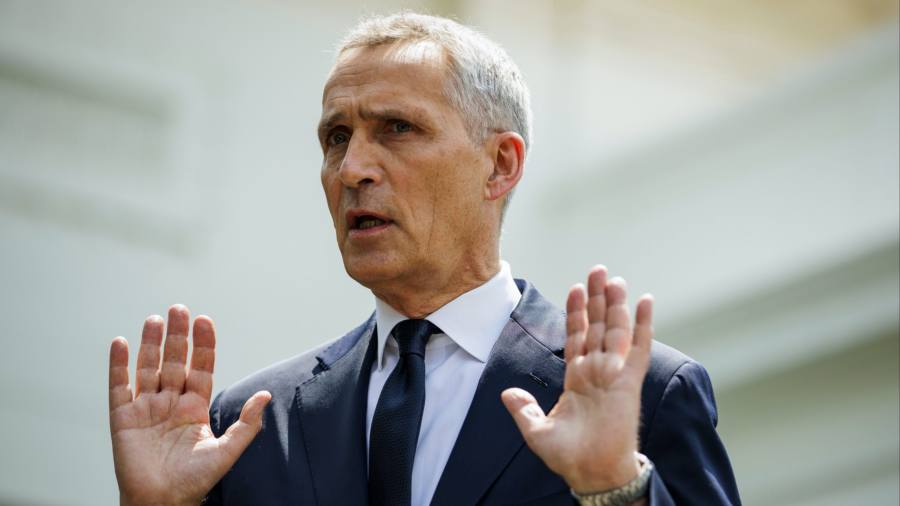Nato leaders are leaning towards extending Jens Stoltenberg’s term as secretary-general amid mounting pessimism around the military alliance agreeing a successor ahead of next month’s summit in Lithuania.
Stoltenberg, who met Joe Biden in Washington on Tuesday, has led the alliance since October 2014. While he has publicly stated that he has “no intention of seeking” to extend his mandate, the former Norwegian prime minister has not unequivocally ruled out continuing.
“In the interests of continuity, it makes sense,” said one senior western diplomat who has discussed the possibility of an extension with him. “He would do it. He is a man of duty.”
The intensifying debates over who should succeed Stoltenberg, whose current mandate ends in October, comes at a testing time for Nato. Russia is showing increased belligerence towards the west and has occupied about a fifth of Ukraine, there are internal divisions over Kyiv’s future relationship with Nato and China is rising as a global military power.
That complex backdrop, and the difficulty of finding a candidate that satisfies all 31 alliance members, mean that the possibility of asking Stoltenberg to extend his mandate for a fourth time has emerged as a short-term compromise that delays the decision to next year, officials involved in the discussions told the Financial Times.
“Stoltenberg has been an excellent secretary-general, and I don’t see the point in rocking the boat right now,” said a Nato foreign minister.
While the US is the most important power in Nato and an American always serves as the alliance’s military commander, the secretary-general has always come from a European member state.
The option to extend Stoltenberg comes after bids by Danish prime minister Mette Frederiksen and British defence secretary Ben Wallace have so far failed to win unanimous backing in the face of a wide variety of demands from member states.
Many capitals have voiced support for selecting the alliance’s first female secretary-general, while others say a nominee from eastern Europe would reflect the region’s growing heft and the importance of the war in Ukraine.
Most countries, including the US and most of the alliance’s largest members, believe the role should go to a current or former president or prime minister, multiple officials said. The US is looking for a candidate who will garner widespread support, believing a current or former head of government has the best chance of securing unanimity.
Selection is also complicated by the requirement that candidates almost certainly require the backing of their home country’s government.
France and Germany swung behind Frederiksen and presented her as Europe’s preferred candidate, despite misgivings in some eastern European states, officials said. But Biden did not lend his full support to Frederiksen at their White House meeting last week, two people briefed on the talks told the FT, puncturing her candidacy’s momentum.
“Who is the next secretary-general? There doesn’t seem to be a handbook of how you choose one,” Wallace said on Tuesday, adding that there were “an awful lot of good candidates out there” when asked about his own ambitions for the role.
Wallace suggested that the decision could even be delayed until after the summit next month. “Who knows?” he told reporters. “That could be done in Vilnius. It could be done in October. It just depends.”
White House spokesperson Karine Jean-Pierre said Stoltenberg had done “a fantastic job” to bring Nato together. But she added that Biden “hasn’t made any decision yet” on a successor.
Extending Stoltenberg’s time in office would also allow him more time to complete the task of securing Sweden’s membership in the alliance, which is being held up by Turkey. Stoltenberg has taken on that task personally, and it is still unclear whether President Recep Tayyip Erdoğan will lift his veto before or during the summit in Vilnius, Lithuania.
At least another seven months in office would also mean the task of appointing a new secretary-general falls on Biden’s leadership of the next summit, to take place in Washington next April, which will come with the added pomp of being the alliance’s 75th anniversary.
“We’re all aware at some point we’ll have to let Stoltenberg go, there will have to be a successor,” Kajsa Ollongren, the Dutch defence minister, said on Tuesday, without elaborating on candidates or timeframes.
Stoltenberg, who is set to see key lieutenants leave Nato this summer, is becoming increasingly irritated about being left without a clear message on his future, according to people close to the secretary-general.
Members of his team in Brussels have already taken steps to relocate their families back to their home countries, adding to the complications over his protracted state of limbo.
Read the full article here




